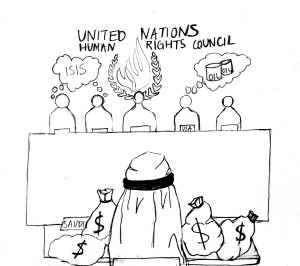Saudi Arabia must abide by international law
Two months ago, Said Boumedouha, deputy director of Amnesty International’s Middle East and North Africa Programme, said, “The recent increase in executions is a deeply disturbing deterioration. The authorities must act immediately to halt this cruel practice.” Considering the context of the current situation in the Middle East, Boumedouha might appear to be referring to the rise of the Islamic State of Iraq and Syria. With four high-profile cases of beheading at the hands of the terrorist organization, the group has become increasingly dangerous in past months.
And yet, the comment wasn’t about ISIS — Boumedouha was talking about Saudi Arabia.
While the rest of the world is preoccupied with ISIS, the epidemic of Ebola, the crisis in Ukraine and other global news, few have been paying attention to the egregious human rights violations taking place in the oil-rich kingdom. Saudi Arabia has executed 59 people this year alone, yet it hasn’t appeared much on media in the U.S. or abroad. Change needs to happen.
Defenders of the practice view the executions as a non-issue, citing the recent turmoil in the region as a reason for the country to flex its muscles and demonstrate to the region and world its strength and resolve. The idea that a country needs to kill its people to showcase its prowess is antiquated and troubling. Whether a country holds Western values or not, the execution of individuals on a large scale because of insignificant crimes is intolerable. It’s not a political issue — it’s a human rights one.
Since 1985, more than 2,000 people have been executed in Saudi Arabia. Yet, the numbers do not even tell the whole story. The country has beheaded people under charges such as adultery and sorcery. If a country in the Middle East were beheading people for non-lethal crimes, one would think that the U.S. would be in arms about this — but it’s not, for reasons that are utterly hypocritical.
Saudi Arabia is the great supplier of oil for the world and one of the wealthiest nations in the world. It is also a strategic ally of the U.S. in the region, and in fact is a key leader in the fight against the Islamic State. As a result, it would be disadvantageous for the U.S. or any country to attempt to break such a critical alliance. Politically speaking, it makes sense to maintain the status quo, but this isn’t just some comment or remark. These are beheadings and executions maintained by a powerful country that essentially excuses itself from international law. The U.S. and the global community need to cut the rhetoric and recognize the abuses and killings happening in Saudi Arabia. Though the kingdom is a strong ally in the fight against ISIS, it also needs to be held accountable for its actions. The U.S., in vowing to eliminate the threat of ISIS while ardently currying the favor of an oil lord, is guilty of the very crimes it decries.
If the U.S. doesn’t stay consistent with the values it stands for, it shouldn’t pick and choose which countries it wishes to align with and which to fight. It is important for the international community to hold a standard to which all countries are held accountable to, not a policy for which an elite few are exempt. Saudi Arabia is essentially trying to stop ISIS from committing the same crimes that the nation is guilty of. For decades, Saudi Arabia has been under the radar in terms of its execution trends, simply because countries don’t want to bite the hand that feeds them. The fight against ISIS offers a unique opportunity to deal with the controversy of Saudi Arabia’s beheadings.
The world needs to pay closer attention to countries that endanger human rights. In an increasingly globalized world connected by the Internet and social media, nothing should be allowed to escape under the radar.
Athanasius Georgy is a sophomore majoring in biological sciences. His column, “On the World Stage,” runs Thursdays.



“To clarify: Wahhabism is the only officially
recognized and allowed religion in Saudi Arabia. Other forms of Islam and other
religions are banned and persecuted by the state.
Saudi Arabia is the only Islamic state in which there is no
church, no synagogue and no other place of worship of any other religion.
Shiite Muslims have been systematically discriminated
against for decades. Jews are even forbidden to enter the Kingdom.
Saudi Arabia practices a form of Sharia law that is one of
the most brutal systems in the world. Saudi Arabia has at all times rejected
the Universal Declaration of Human Rights of 1948.
Women may not drive a car and can be punished by flogging.
Corporal punishment, including amputations and executions, are part of everyday
life in the country. Just two weeks ago a Sudanese immigrant in Saudi Arabia
was publicly beheaded for ‘sorcery.’ Saudi Arabia is one of the few countries
in the world in which the death penalty is enforced even on teenagers,”
the paper said.
Muslims do not abide by man made laws (international laws) but only to Sharia law. Sharia law and Islam are inseparable. This is why many Muslim countries refuse to sign the UN’s Universal Declaration of Human Rights.
Islam is, in fact, a religion incompatible with international laws and, for that matter, it is incompatible with our Constitution too.